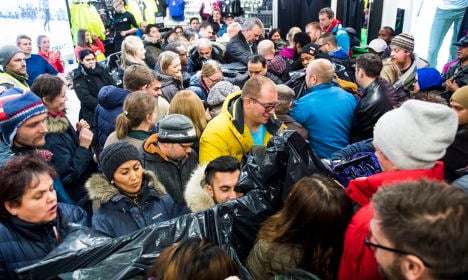Black Friday is the starting shot of a shopping bonanza that continues until Christmas, where fast fashion companies dump their prices to record-low levels so that we can all feel like we got a really good deal. Imagine if Black Friday had been a day filled with experiences and culture instead…
Businesses usually expect increased sales figures on that day compared to the one before, and many buy the whole Black Friday concept. We do it, despite all we know about the circumstances the products have been produced under. So I don’t need to tell you that your clothes can include hazardous chemicals which pollute our planet.
I don’t need to tell you that the factories get their energy supply from dirty coal plants which affect our climate. Nor do I need to tell you that those who sew your clothes work under terrible conditions and are sometimes children, because you know that already.
Despite knowing all that, we are shopping more and more. Today we buy as much as up to 60 percent more clothing compared to 15 years ago. In addition we only use our clothing for half as long a time.
In Europe only around a tenth of clothing that is recycled is used second hand. The rest is exported to poorer countries. Imports are so high in many countries that they have stopped or put restrictions on it, because the imports risk putting the local market out of the game.
Only a few decades ago clothing from Europe and the USA was usually of good quality and had a high second hand usage. That is no longer the case. Much of what is sold today is of such poor quality that it can’t be sold again, whether here at home or to the places clothing is exported to. That risks creating big problems for the second hand sector.
We clearly need to close the circle, by producing quality textiles which can then be recycled into materials that can be used in new clothing. The myth that all clothing is reused or recycled can produce a sentiment of increased consumption being justified.
Fashion companies and producers must take the biggest responsibility in converting the current trend or fast fashion into a trend of respect for the planet’s limits, and also respect for the consumer’s concerns and needs. It’s in that way that we can create fashion for the future.
The easiest step that we can take as individuals is to use our clothing for longer. Take care of them, repair them, remake them, swap them with friends and give them a longer life. Increasing the life of a garment from one to two years reduces its emission value by 24 percent, according to the independent expert group Carbon Trust. The same thing if you buy second hand.
Black Friday’s consumerism has become the starting point for the Christmas celebrations, despite all that we know about chemicals, coal power plants and working conditions.
Celebrating Christmas should instead be about families, friends, and love. Buy theatre tickets, buy art, buy experiences. Experience, enjoy, have fun. Make these days where sports arenas, theatres and cinemas are full and museums break visitor records. Make Black Friday a day where we take care of one another!
This is a translation of an opinion piece written by Greenpeace Nordic's Rosanna Endre which was first published in Swedish by Metro.


 Please whitelist us to continue reading.
Please whitelist us to continue reading.